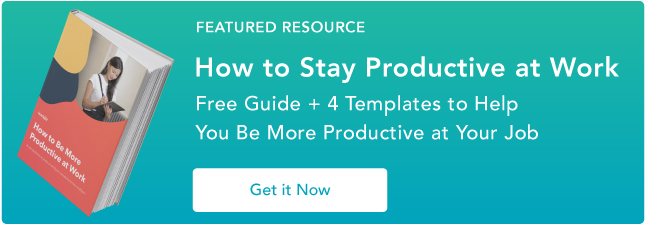When I started working from home, I thought work-life balance would come naturally. After all, I have no commute and I don't need to plan what I'll wear each workday. And when it's all over, I can close my laptop and turn on the TV.

Now, I realize how hard it is to achieve work-life balance, whether you work remotely or in an office.
If you work from home, you're technically still at work – which can throw off the balance. And if you work in an office, commuting to and from work can eat into your personal time.
Luckily, there are many ways to balance work and life, whether remotely or in person.
Let's explore five secrets to achieving work-life balance, according to HubSpot employees. But first, what is work-life balance?

What is work-life balance?
Work-life balance describes how your work intersects with your personal life, such as family, leisure or health. Ideally, you want a balance in which you are not sacrificing your personal life to continue work or vice versa.
Before working at HubSpot, I was a reporter for various TV stations.
Any journalist will tell you that it's easy for the profession to take over your life, leaving little time for hobbies, leisure or personal relationships – because there's never a day off for breaking news.
When I focused too much on work, my relationships with friends and family suffered, which negatively impacted my mental health. On the other hand, when my personal life overshadowed my professional life, my work suffered.
So, how do you strike the right balance? I spoke to some colleagues at HubSpot and drew on their personal experiences to provide insight. So, let's consider different ways to maintain a healthy work-life balance.
5 Tips for Work-Life Balance
1. Set boundaries.
Regardless of your passion for your job, boundaries are important to balance your personal and professional life.
“Setting boundaries is one of the greatest strengths I've been able to master in my professional working career,” says Linda Huard, senior technical recruiter at HubSpot. “And, as part of setting boundaries, I don't install work apps on my personal devices.”
This means Slack, work email, and LinkedIn are not on his phone.
“It's very tempting to check in during non-working hours,” she says. “I tell anyone that when I work with them and am in front of their laptop, I'm giving 110%. , but when I'm offline, I shut down completely. This means that evenings, weekends, holidays and vacations are entirely mine.
Huard says to set these boundaries early and stick to them.
Setting boundaries is definitely something I still struggle with in regards to work-life balance.
In fact, the night before writing this post, I logged into my work computer at around 9 pm and spent the rest of the evening ruminating on work instead of relaxing before bed.
So, I can assure you from experience that keeping business apps away from your phone or putting away your work laptop after you get off work is an effective way to maintain balance.
At the very least, it can ensure a peaceful evening before you have to start the day again.
2. Practice self-care.
Speaking of peaceful evenings, do you know what I should have been doing instead of checking my work emails before bed? The answer is my nightly self-care routine: good food, light music, and a little reading before bed.
Practicing self-care is important not only for work-life balance but also for overall mental clarity and well-being.
A national survey shows that 64% of Americans who practice self-care have experienced increased self-confidence, and 67% have seen increased productivity. Additionally, 71% say they have noticed an increase in overall happiness.
“One thing that has been really helpful for me is [regarding work-life balance] Focusing on self-care,” says our corporate development representative, Olurotimi Moses. “For me, this looks like meditation, music, candles, and bubble baths. Whenever I can, I spend a day at the spa.”
Rest will help you recover from the day's fatigue and be refreshed for the next day.

3. Try co-working.
Co-working is especially helpful if you're like me and work from home. I live in a small studio, where I'm always near my TV, phone, books, or dishes that need washing.
With everything going on around you and no managers or coworkers in sight, it's tempting to lose your focus.
So, I'll sometimes FaceTime a close friend who works from home, and we'll catch up together. We know that if we allow ourselves to stray from our actions, we will hold each other accountable and rebuke each other.
I find I get a lot done this way.
“I work quietly on Zoom for an hour every week with my best friend,” says Julia Gueron, principal marketing manager. “He's all over the country. It's a great way to keep in touch with her, and I feel more focused if someone else is equally busy with the work.”
“Sometimes we stop to chat,” says Gueron, “but it's important to do so with someone I can be honest with and say: 'Hey – I really need to work out now. .'”
4. Know your style.
Some people wake up feeling ready to take on the day, so they dive straight into their most difficult tasks first thing in the morning.
On the other hand, I'm a night owl – so I'm more productive at the end of the day or early afternoon.
As a result, I warm up my work day by managing simple responsibilities, like responding to emails, checking Slack for any important messages, or scheduling future meetings.
Once the coffee and breakfast starts and I'm more alert, I'm ready to write the wonderful blog posts you're used to reading from me. After all, perfection takes time.
This is my working style; It helps me get work done while setting realistic goals.
“I've been working remotely for 11 years and I've found that you have to lean into your remote work style,” says Steph McDonald, HubSpot's lead recruiter. “For me, I get to my desk at 9 a.m. and rarely have time off before leaving at 5 p.m.”
McDonald says everyone's work style is different, and others may take microbreaks or go for a workout during the day to refresh their energy.
“It's OK to have different styles as long as it gets the job done,” she says.
5. Set expectations with friends and family.
When I was a journalist, I lived with my family.
I'll never forget how many times I got a call from my parents during the workday, complaining about unwashable dishes or asking if I could have my mom's favorite fruit on the way home.
Although they meant no harm, the constant calls and texts were distracting and affecting my productivity. So, I had to talk to my parents about respecting my work hours and saving these conversations for after I got off work.
My colleague, marketing manager Tristan Taylor, experienced similar problems when she started working from home.
“When I started working from home, a new challenge I faced was trying to convince my family that I was actually working from home,” she recalls.
She says, “At the time, I was living in the city near my family and I had the experience of meeting people unannounced who wanted to go out to eat or run errands, and when I repeated I had a habit of boasting that I could do this. Just get up and don't go anywhere.
Like me, Taylor also suggests setting boundaries and expectations with your family, friends, and coworkers.
“You can't afford to be distracted by the people who live in your house or who come over with you, so let them know that your schedule is more rigid than they expect,” she says.
Taylor says, “On the other side of the coin, let your manager know that you have strict start and stop times to ensure you're not overworked or taking on too much work beyond your rhythm or job description. Not taking it.”
So, make sure everyone, professional and personal, has a clear understanding and expectations about your schedule.
Even if they mean well, you don't want your friends to come between you and your work, and you don't want your coworkers to give you more work than you can handle.
Maintaining work-life balance can be challenging, but it's worth it if it means managing your overall well-being while remaining productive and a valuable asset to your team.



